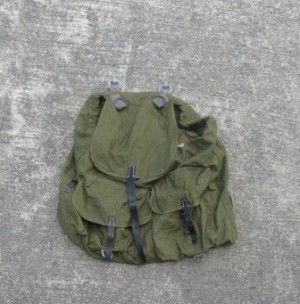
I just read a book on the Channel Islands in WWII, which mentions things being kept in a plastic sack. I know Bakelite was around then but was soft plastic? The guy with the sack was a doctor (if that has any relevance). The Channel Islands were occupied and they were short of all the basic stuff. Perhaps the Germans had plastic sacks and he liberated one? This is really bugging me and Google has been no help. Deeli, where are you? Help!
By Marg
Add your voice! Click below to answer. ThriftyFun is powered by your wisdom!
Well, I am not Deeli (she's great), and I am not a bakelite expert, but bakelite in general was sort of a hard plastic type stuff. I am not aware of a soft form of it. I am a post -WWII (a baby boomer).
I lived in London through WW2, no plastic bags. Women, who shopped almost daily because there were no refrigerators, had baskets, string bags, dry light weight but held a lot. Also no peanut butter, spam, until US troops brought them
The movie "Saving Private Ryan" shows American solders landing on Omaha Beach on D-Day with plastic bags covering their riffles.
The author may have been mistaken. I do not believe they had plastic then but they did have rubber which they melted and painted onto canvas making it waterproof. They also had oil cloth which was similar but not as durable.
Once upon a time there was latex, then came Prince Goodyear who invented vulcanization which made rubber more flexible, more elastic. Its invention led to the creation, among other things, of the modern condom in the second half of the 19th century. In the 1910s, the American condom manufacturers Trojan and Ramses and the English Durex began to sell condoms at a very affordable price touting the fact that the condoms they made were not reusable.
Check out en.wikipedia.org/
I googled the history of plastic and got this:
inventors.about.com/
It gives a time line of things dating all the way back to the 1800's and yes, it's possible to have real "vinyl" which is a form of plastic in the era during the war.
I saw a movie depicting the conquest of California, and heard a general say "I am not made of plastic"! Once you hit dictionary.com however, you realize it's a concept of something "having the power of molding" so then it didn't drive me so crazy. It was a silly mistake, but if you consider the quality of movies in the 50's it's forgivable. PBP
I think Noella and I were typing at the same time! Great minds!!
You are so sweet, Marg! I just found oodles of possiblities and saved the links and some photos in a Word document. I have to skeedattle until tomorrow (some calls and errands to get done today) but I promise to research further tomorrow! A couple of those links look like they are German WWII equipment specialists and also make scaled models of the equipment so I will contact them and ask what they know about the sacks in question.
Oh, and I think Lilac is very likely spot on with her idea about the use of rubber. And Germany did have trade agreements with Brazil including purchase of their rubber at that time :-)
Could the writer have used a term out-of-time? If the writer was born in an era where plastic bags are literally everywhere, he or she may have unconsciously substituted the word 'plastic' to describe a bag made from waxed cotton or oil cloth-both waterproofing methods used to make waterproof rucksacks and bags back then.
The closest best answer I ended up finding, Marg, is that it likely was a weather coated ruck sack. Even if the doctor wasn't a soldier he might have used one because it has more space than a standard doctors bag. This photo is supposed to be of an authentic German WWII ruck sack.
Even if the author didn't mean this exact kind of bag at least there's a very plausible bag to envision now :-)

Marg, I submitted a comment with info and a picture for you here a few hours ago and see it's still not showing in the comment section :-( I'll check in the morning and hopefully it will be here then and if not I'll find out why it didn't post and try to reconstruct the answer.
Thanks to everyone for the very helpful replies. The 'mind-slip' is on the back burner. The book was written by the doctor himself but not until the '80s so it's still a possibility. The sack was being used to carry equipment for maternity cases so that rucksack with all the pockets would be ideal, Deeli., but he was an Islander, I don't think the occupying power would be too happy! I think you're right, some kind of weatherproofed bag -not plastic as we know it but yes, at least I can imaging it now. Thanks Deeli and all.
Of course I meant imagine!
Marg.
Thanks to everyone for the very helpful replies. The 'mind-slip' is on the back burner. The book was written by the doctor himself but not until the '80s so it's still a possibility. The sack was being used to carry equipment for maternity cases so that rucksack with all the pockets would be ideal, Deeli., but he was an Islander, I don't think the occupying power would be too happy! I think you're right, some kind of weatherproofed bag -not plastic as we know it but yes, at least I can imagine it now. Thanks Deeli and all.
Marg
It's not my day, is it?
Marg.
Home was London in WW2 and I'm sure there were no plastic bags. Shopping bags and baskets, or string bags had to be taken to the shops or what would you do with apples or potatoes etc. no worries about oranges or bananas, there weren't any. No peanut butter or nylon stockings until the "Yanks" came. But we did have dried eggs! I could go on at great length. We did have wonderful bread bakeries in London, every family had its favourite, it wasn't rationed until 1948, such irony as the Marshall plan didn't include us. Stop me please......
I had no idea I was replying to something from October 2011.
Chagrined.
Just seen your reply. Thanks anyway!
Marg from England.
Add your voice! Click below to answer. ThriftyFun is powered by your wisdom!